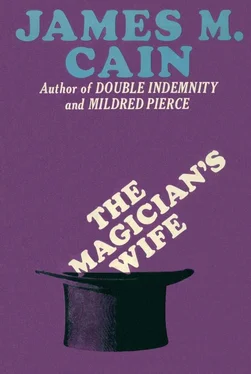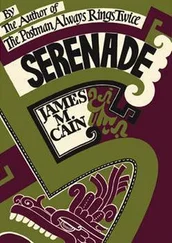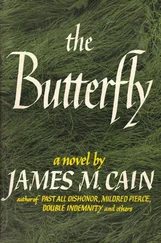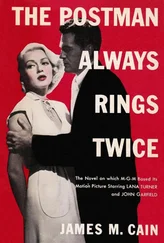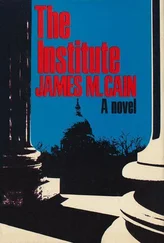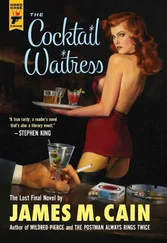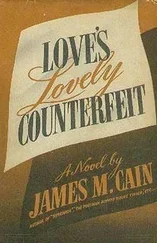James Cain - The Magician's Wife
Здесь есть возможность читать онлайн «James Cain - The Magician's Wife» весь текст электронной книги совершенно бесплатно (целиком полную версию без сокращений). В некоторых случаях можно слушать аудио, скачать через торрент в формате fb2 и присутствует краткое содержание. Город: New York, Год выпуска: 1965, ISBN: 1965, Издательство: The Dial Press, Жанр: Детектив, на английском языке. Описание произведения, (предисловие) а так же отзывы посетителей доступны на портале библиотеки ЛибКат.
- Название:The Magician's Wife
- Автор:
- Издательство:The Dial Press
- Жанр:
- Год:1965
- Город:New York
- ISBN:978-1299526174
- Рейтинг книги:5 / 5. Голосов: 1
-
Избранное:Добавить в избранное
- Отзывы:
-
Ваша оценка:
- 100
- 1
- 2
- 3
- 4
- 5
The Magician's Wife: краткое содержание, описание и аннотация
Предлагаем к чтению аннотацию, описание, краткое содержание или предисловие (зависит от того, что написал сам автор книги «The Magician's Wife»). Если вы не нашли необходимую информацию о книге — напишите в комментариях, мы постараемся отыскать её.
The Magician's Wife — читать онлайн бесплатно полную книгу (весь текст) целиком
Ниже представлен текст книги, разбитый по страницам. Система сохранения места последней прочитанной страницы, позволяет с удобством читать онлайн бесплатно книгу «The Magician's Wife», без необходимости каждый раз заново искать на чём Вы остановились. Поставьте закладку, и сможете в любой момент перейти на страницу, на которой закончили чтение.
Интервал:
Закладка:
“Suppose I had a candidate?”
“Well, now, that would be a help. Who is he?”
“So happens, it’s a she.”
“Ah! Ah! Ah!”
“For this job how much do you pay?”
“Four-figure money, I think.”
“Consider your problem solved.”
He could hardly wait, when Pat took a cab to the hotel, to call Grace. She seemed a bit sleepy, even a bit grumpy, but eagerly he poured out the news of his luck. “Maybe I shouldn’t have waked you up,” he admitted, “but I wanted to tell you myself, before you saw the papers — and this is the first chance I’ve had. Pat has just gone home.”
“Well! I’m certainly glad.”
“But, Grace, that isn’t all there is to tell!”
Bubbling with excitement, he told about the picture, saying: “Of course, we know it’s done, but they don’t — Grant’s, I mean. And, Grace, they’ll pay! Four-figure money, he said, which is at least a thousand dollars. Is that worth waking up for? Is it?”
“... I imagine it better wait.”
“Wait? For what?”
“Till you’ve straightened things out with Sally.”
“Sally? What does she have to do with it?”
“Haven’t you told her?”
“No, and I don’t intend to!”
“Clay, you’d better.”
“Are you starting that over again? Why? ”
“For the same old reason: you’re in love with her. And, for another reason, Clay: she’s going to be at the party!”
“... You mean — Bunny’s? ”
“I picked out her dress this afternoon.”
“I’m sorry I woke you, Grace.”
“You stay away from that party, dumbbell. Did you hear what I said? Let Pat go there alone — send Bunny three dozen roses, five dozen, ten. Don’t go, don’t go, don’t go!”
11
The Granlund house, known as “Calvert Hall,” was a fine specimen of old Maryland architecture, as well as an object lesson in the difference between things as they are and things as they seem, if adroitly distorted. From Queen Caroline Street, seen at a distance, screened by shrubbery and dwarfed by stately trees, it seemed modest in size, even small. It was of brick painted white, and in five sections: a center hall, two wings a short distance off, and two “hyphens” connecting. Its lines were thus broken, in the form of a careless sprawl, or what appeared to be a sprawl. Close up, however, from the rose garden out front, the illusion of happenstance, of small informality, vanished, and reality appeared, in the form of a stately, full-fashioned mansion. Ordinarily Clay loved it, though just as ironical as anyone at the regency of the Granlund tenure, and he often stood admiring it, perhaps imagining himself as owning it or some place not too unlike it some time in the future. Today, however, as he pulled up on the oyster-shell drive, all he could see was Sally’s coupe parked near the door. It was the only car out there, as Pat had reminded Clay that he was the guest of honor, and as such bound to come early, “as a grand entrance later just louses the hostess up.” So no one else had come, and Clay was even more nervous than he had been at the office, during a hectic morning hour of shaking hands with everyone.
And sure enough, once a colored functionary had let them in, she met them in the hall, trim in a black silk print with red poinsettias, holding her hand out to Pat. “Mr. Grant,” she said prettily, “welcome to Calvert Hall — I’m Mrs. Alexis, and I’ll present you to the Granlunds.” Then, turning to Clay: “Mr. Lockwood, so nice of you to come, so nice to see you again.” She didn’t shake hands with him, and he made no effort to. Holding up a finger to wait, she went to the great arch of the east hyphen and stood as though waiting for some signal. “Clay,” whispered Pat, “I see good manners aplenty — it’s all you do see nowadays. I don’t see easy manners — but that girl has ’em .” Clay agreed, fighting off pride in her. Then she nodded to someone, came over, took Pat’s arm, and led through the hyphen, a bower of green things in boxes, to the great drawing room beyond. There the Granlunds were drawn up in the middle of the floor: Mrs. Bunny Granlund, a large woman of forty, who proclaimed every whim, endearment, confidence, joke, and considered opinion at the top of her lungs, as though all within earshot were deaf; Mr. Steve Granlund, a tall, dour man, with the icy affability that seems to be the interchangeable mark of grand dukes, bishops, and headwaiters. He greeted Pat cordially and congratulated Clay on his promotion, which he had read about in The Pilot. Mrs. Granlund fell on Pat’s neck, then put her arms around Clay, calling him “Dear boy” and “Our own Clay.”
When she had placed Pat beside her, where the guests could be presented, Clay wandered off to a corner, relieved that nothing special seemed to be expected of him. There Sally followed, telling him: “Bunny asked me to take you in, as your partner, for lunch — and I said I would. Was that all right?”
“Why, yes,” he said, sounding queer. “Sure.”
“Well, you don’t act very pleased.”
“I’m surprised, that’s all, that you’d want to take somebody in that had mock-orange juice in his veins.”
“Mock-orange love is what I got — I’ll say it was quite a letdown. But who am I to complain? If at first you don’t succeed, try, try again.”
“Now, what’s that supposed to mean?”
“You’d like to know, I bet.”
Her look had guile in it, and he tried to growl something, but nothing seemed to come. Then, lamely, he said: “So — I guess we’re partners.”
“O.K. — wait for me.”
The guests, when they began arriving, were mainly men, bringing regrets from wives all over the earth, the sea, the mountains, and Europe. But a few women came too, heavily sunburned, in silk, cotton, and linen suits, all eager to help Mrs. Granlund prove her distinguished origin, before she invested it in restaurant millions. Service, at tables for four in the big dining room, was by a Washington caterer, with elegant Negro help, and not by the Portico staff, which for such an affair was a bit on the folksy side. But Sally had a table for two by the wall near the kitchen door, and from this post of vantage steered things with sharp efficiency. Under these conditions not much could be said, and Clay made no effort to say it, retiring into silence and resuming the sulk that had slipped without his meaning it to. But presently, during a lull, Sally asked in a casual way: “When is he going back? Your most likable Mr. Grant.”
“He’s taking the four-o’clock plane.”
“You mean, today?”
“From Friendship. I’m riding him there myself.”
“Then you could be free tonight?”
He looked up to find her staring at him in an arch, innocent way. “I could be,” he answered gruffly. “I am. Why?”
“I could pay you a visit. I still have my key.”
He was too shaken for some moments to trust himself to look at her. Then he did, and told her: “I’m sure you could, but you’re not going to until quite a few things are explained.”
“If you mean what I did to your place,” she whispered, leaning close, “I’m not sorry for that — I’m glad. Listen, when I go to you, in the frame of mind I was in, and you —”
“There’s also that piece in the paper!”
“What piece in the paper?”
He recited The Bosun’s item, and she said: “So you think I tipped him off? All the trouble that that caused me? Do you know what it almost caused? Him breaking off with her — he began making passes at me. Well you must think I’m dumb!”
Читать дальшеИнтервал:
Закладка:
Похожие книги на «The Magician's Wife»
Представляем Вашему вниманию похожие книги на «The Magician's Wife» списком для выбора. Мы отобрали схожую по названию и смыслу литературу в надежде предоставить читателям больше вариантов отыскать новые, интересные, ещё непрочитанные произведения.
Обсуждение, отзывы о книге «The Magician's Wife» и просто собственные мнения читателей. Оставьте ваши комментарии, напишите, что Вы думаете о произведении, его смысле или главных героях. Укажите что конкретно понравилось, а что нет, и почему Вы так считаете.
